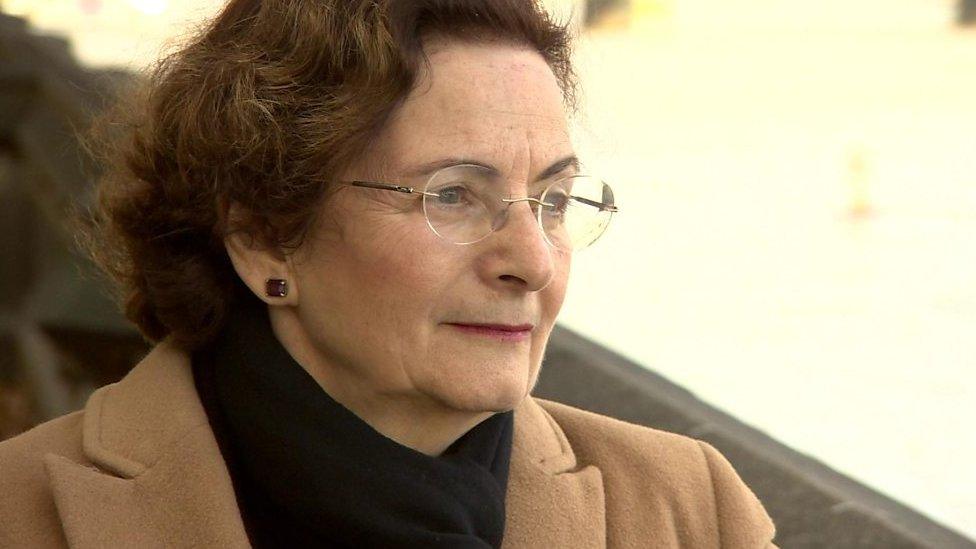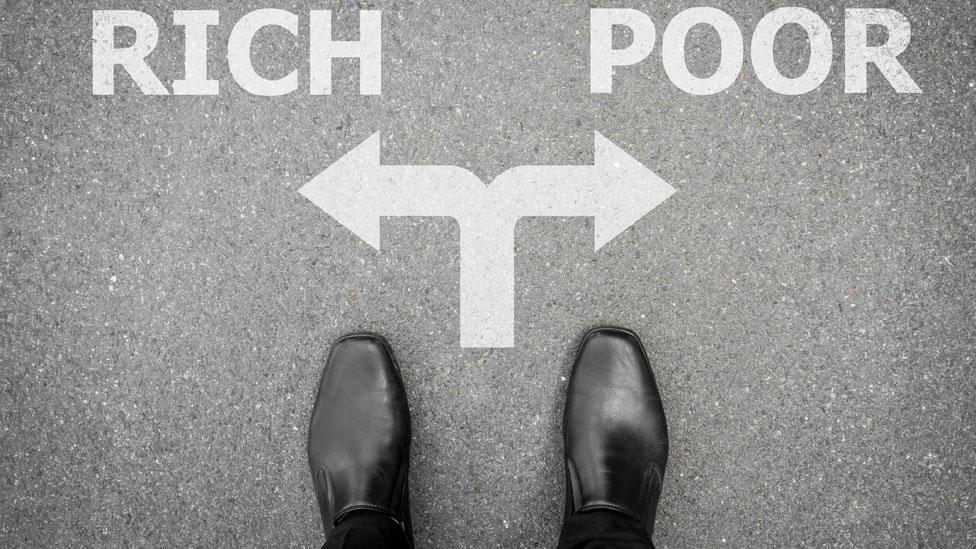Unequal Scotland: Baby boomers vs millennials
- Published

Scottish government adviser Naomi Eistenstadt says baby boomers are the last "safe" generation
"My generation is the last generation that is safe," says Naomi Eistenstadt, independent adviser to the Scottish government on poverty and inequality.
"I'm the last of the baby boomers, and I think it is absolutely appalling, the amount of free stuff I get at the cost of younger families, particularly families with children, and in fact working age adults with children."
With Naomi Eisenstadt, I'm among the last of the baby boomers, if you date the boom from 1945 to 1965. My selfish concern is that all the older baby boomers will have mopped up the resources for older age before I get there.
But that's nothing compared with the prospect facing a younger generation.
At BBC Scotland news for the past week, we've been looking at different facets of inequality; income, gender, wealth, learning and health.

It's no surprise to find Scotland is unequal. However, readers, listeners and viewers may have learned something new about the extent of it, and got a realistic take on how it compares.
That is, yes, it's unequal, but on most counts, it's comparable with similar countries, except on health.
New dynamic
The element of inequality that has emerged quite quickly, and particularly since the financial crash, is the gap that is not between the prosperous and the deprived, but between the baby boomers and the millennials - adults aged up to around 35, born between 1981 and 2000.
That is interesting because it's new. It brings a new dynamic, and it's unusual because it draws the prosperous young into a common interest with the deprived young.
And while the young continue to vote less, they'll probably continue to get decisions going against them and made by their elders - on Brexit, the US presidency, and arguably Scottish independence.
(When I write 'arguably', that's an invitation to others to argue about it, as they surely will.)
Free education
So what is at the roots of this generational divide?
Twenty years ago, the ranks of those below the poverty line were overwhelmingly elderly. It has been one of the successes of public policy that that has changed quite radically. Anti-poverty campaigners point out that is a lesson that, yes, it is possible to tackle poverty effectively.
This was done through the state pension, pensioner tax credits, pensioner benefits, from fuel allowances to free bus travel to free TV licences. The law was changed to let older people choose their retirement date, allowing many to keep working because they want to, or because they have to, financially.
So we now have an older generation that has strong welfare support and the relatively generous end of the workplace pension scheme, with defined benefits and many having been able to retire early.

That generation benefited from genuinely free education, usually graduating with only modest debt. It was quickly able to get on the housing ladder. They then benefited from the housing price boom.
They set out in the workplace at a time when trade unions were strong, and ensured younger workers' interests were looked after.
Housing ladder
Contrast that with now (using numbers that are almost all about the United Kingdom or Great Britain, as the statistics for Scotland are not good):
Student debt, and lots of it, even if your tuition fees are free.
The housing ladder out of reach, at the mercy of landlords (or parents!), without the opportunity to build wealth through paying off a mortgage.
Since 2000, the median British house price has gone from six times average twenty-something annual pay to more than ten times (according to the campaigning group Intergeneration Foundation).
The Intergeneration Commission claims that a baby boomer was 50% more likely to own her or his own home at the age of 30 than a 30-year old millennial.
A shonky career ladder, starting on low pay, and often staying there. The ratio of twenty-something pay to the whole workforce average has been worsening for the young. To progress, they often have to leave one employer and find another.
Under-employment for many graduates who are not using the skills they gained in higher education.
Older workers staying in place where previously they had to retire, blocking career progression.
Generation X
The Intergenerational Commission, set up by the Resolution Foundation labour market think tank, says that those born in 1988 are earning the same as 27-year olds were earning in the year of their birth. A millennial in her or his 20s is earning around £8,000 less than Generation X, which immediately preceded it.
The cost of state pensions, and for a rising number of pensioners, who are living longer, is costing the average worker more. Between 1985, the cost of pensions per UK worker has risen from £1600 per year to £2800, in real terms, an increase of 73%.
The "triple lock" on pensions means the pension will go up by the lowest of average pay, inflation and 2.5%.
Working age benefits are being squeezed, including family tax credits and family allowance.
According to the Intergenerational Commission, George Osborne left the Treasury with plans to take £1.7bn from working age benefits over the next four years, while pension-age people get £1.2 billion more.
The government has outsourced this process. The BBC is required to use the licence fee to take from younger payers and give free licences to older pensioners, fulfilling an election promise that the UK government was not willing to fund from tax receipts.
Unfunded pensions
Pension schemes that have mostly abandoned defined benefits in favour of defined contributions - that is, the contributor takes the risk that the savings won't deliver income through retirement.
Many public sector workers have unfunded pensions, meaning they will have to be paid by future taxpayers. The value of that pension commitment per UK worker has risen from £11,000 to £44,000 since 1985.
The government's debt burden has grown through years of very high public sector deficits. In 2002, it was just over £20,000 per UK worker. It is now more than £50,000, and rising.
An economy which is delivering significantly poorer returns on investments or savings with which to build up assets and save for pensions.
And if the young are no longer able to work across the European Union, their job opportunities are massively curtailed. There may, on the other hand, be opportunities opening up in agriculture when Romanians are no longer allowed to harvest Brussels sprouts in East Anglia and raspberries in Angus.
Skewed
It's an issue the Commons select committee on welfare and pensions has recently looked at. It concluded that the triple lock on pensions needs to be retired from 2020.
Reporting earlier this month, the MPs said: "The welfare state has long been underpinned by an implicit social contract between generations.

"The provision of benefits and public services to the current pensioner population is funded by the taxes of the current working-age population. In turn they expect to receive similar benefits and services when they retire, and so on. The skewing of the welfare state has placed the intergenerational contract under strain."
But there's a warning that this is not the time for Intergenerational warfare. The debate "should not be conducted in divisive or adversarial terms.
"Each generation cares deeply about their children, parents and grandparents alike. It is not the fault of baby boomers that the economy, or certain asset prices, have become skewed in their favour.
"But the absence of fault does not obviate the need for policy action. The recommendations in this [select committee] report are intended to strengthen the implicit contract between generations that is at the heart of our society".
According to the Intergenerational Commission, which is only now starting its work, there has been a sharp shift in public opinion towards support of the case for much more house building, to help cut housing costs for younger people. In the case of baby boomers, it is claimed, more than half would now accept it in their local area.
"Renewing the intergenerational contract is a shared challenge for our times," according to the Commission.
"For all the talk of generational war, people - whatever their age - share concerns for the fate of the next generation, for their children and grandchildren."